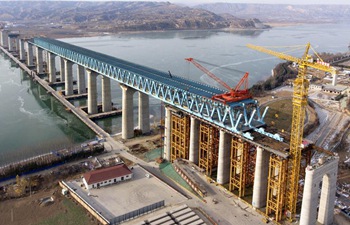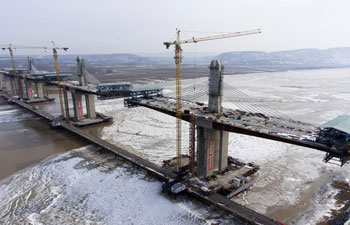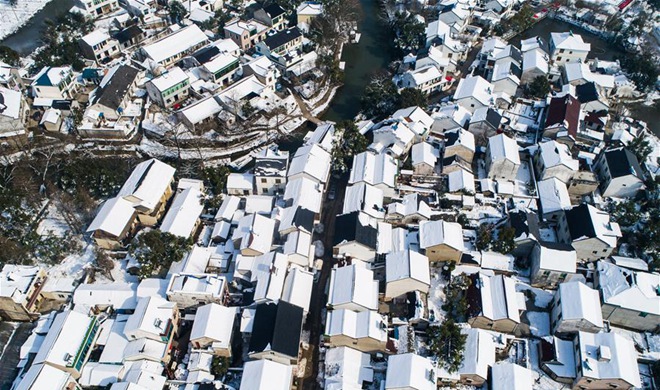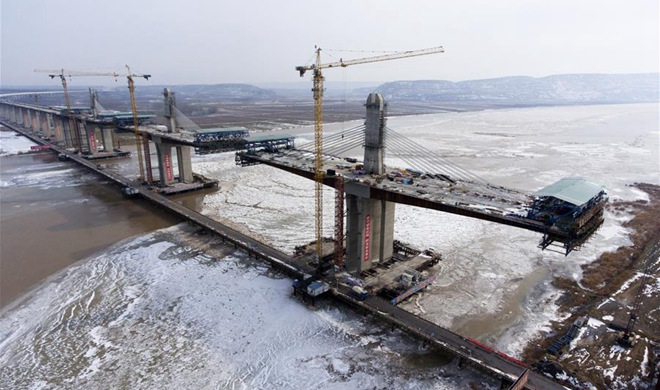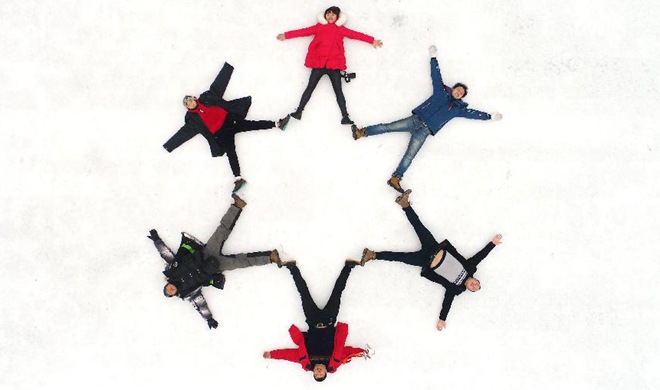by Keren Setton
JERUSALEM, Jan. 30 (Xinhua) -- Israel's controversial migrant policy that tells African migrants to leave or face imprisonment has triggered heated debate.
The Israeli government is giving African migrants three months to leave the country or face jail time if they do not.
The migrants slated for deportation are those without families that have not submitted a request for refugee status as of Jan. 1, 2018.
In the past years, Israel has been implementing a plan intended to wipe out the migrant population in the country. According to the Population and Immigration Authority, there are almost 40,000 migrants in Israel, or what it calls "infiltrators" who entered the country illegally.
In 2017, over 3,000 migrants left the country as part of the plan.
Israel's total population is approximately 8.5 million.
The majority of the migrants, over 70 percent, come from Eritrea, with 20 percent coming from Sudan, both countries with a questionable track record in upholding human rights.
The Israeli government, led by Prime Minister Benjamin Netanyahu, has led a policy in which those leaving the Jewish state by the end of March this year will be paid 3,500 U.S. dollars. Their plane tickets will be funded by the Israeli government. They can either return to their homelands or choose a third host country, Rwanda or Uganda, with which Israel has agreements with on the matter.
The Israeli Supreme Court, which has been deeply involved in the sticky issue, ruled both Rwanda and Uganda safe destinations, as opposed to the claim of various humanitarian organizations in the country.
Israel does not have diplomatic relations with Sudan and can therefore not deport the migrants back there.
But even though the controversial policy is making headlines now, Israel has never been very welcoming to non-Jewish migration.
"This is a long term policy by which it is believed that Israel is a Jewish state, not an immigration state. The idea of the refugee convention is a very difficult one for Israel to digest and therefore the goal is to narrow down the possibility of giving refugee status as much as possible, especially when that status gives rights and leads to establishing permanent residency," said Attorney Anat Ben Dor of the Refugee Rights Clinic at the Tel Aviv University.
Only in 2013 did the country regulate the request process for refugees, making it more transparent. Until then, the process was virtually non-existent and migrants were not expelled but not recognized either.
According to official statistics, the height of the influx of migrants was between the years 2010-2012, during which thousands of African migrants entered the country illegally. After that, Israel began accelerating the erection of a wall along its southern border where the overwhelming majority of immigrants entered from.
The 2017 statistics which showed no migrants entering the country last year were a source of pride for the Netanyahu government.
"Israel does not want to become a destination for mass migration," said Yonatan Jakubowicz, founding director of the Israeli Immigration Policy Center and a leading advocate for the so-called "Infiltrators law." "Israel sees what's going on in Europe where that policy has failed," he added.
The Israeli government has maintained that the majority of migrants are economic ones and not asylum seekers as some advocacy groups in the country claim.
Jakubowicz said only a small fraction of migrants have applied for refugee status -- proving the government's claim. Statistics on the matter vary, ranging from 50 percent to 80 percent of migrants seeking refugee status.
According to the Aid Organization for Refugees and Asylum Seekers in Israel (ASSAF), Israel has the lowest refugee recognition rate in the Western world -- less than one percent.
"The asylum system in Israel is not an honest system that really seeks to give refugee status. It is really a system that is intended to deny the applications," Ben Dor told Xinhua.
Israel, established in the aftermath of the Holocaust, and itself host to a large population of Jewish refugees from around the world, finds itself in a moral dilemma.
Opposition to the migrants in the country is not small and many fear that the existence of a growing non-Jewish population will threaten the country's Jewish character.
"In twenty or more years, this can cause a problematic change in the population's diversity here," said Israeli parliament member Miki Zohar, a member of Netanyahu's Likud party.
Jewish residents of south Tel Aviv, Israel's commercial capital, have been complaining for years of violence in the area which is the home to many of the migrants.
But in recent weeks, there are different voices against the expulsion policy.
Holocaust survivors, former diplomats, doctors and pilots who refuse to fly the migrants back to Africa -- have all raised their voices against the expected deportation.
In an open letter to the Israeli leader, 800 Jewish clergymen from the United States urged reconsideration of the policy.
"Our own experience of slavery and liberation, and our own experience as refugees, compels us to act with mercy and justice toward those seeking refuge among us," the letter read.
A left wing parliament member was removed from a Knesset meeting on the matter after calling a Likud member a "friend of the Nazis" for supporting the policy.
"One would hope that a country with such a historical memory would act differently," Anat Ben Dor told Xinhua.
Netanyahu has so far remained unfazed.
Speaking at a cabinet meeting earlier this week, he was steadfast in his position, calling the campaign against the policy "baseless and absurd."
At the Knesset, Israel's parliament, there was a heated debate about the issue, as Jakubowicz sees Israel's policy as a success.
"Israel has taken a very balanced position here ... (it) is not willing to absorb a mass influx of migrants and is looking for that middle ground ... other countries can learn from Israel even though it is taking a lot of heat," he said.
Israeli media has reported that the police is preparing for violent confrontations.
Polls published in the media show support for the government policy despite the controversy.
It seems there are no more hurdles and at the end of March there will be a forceful deportation of migrants from Israel back to African countries. Enditem





